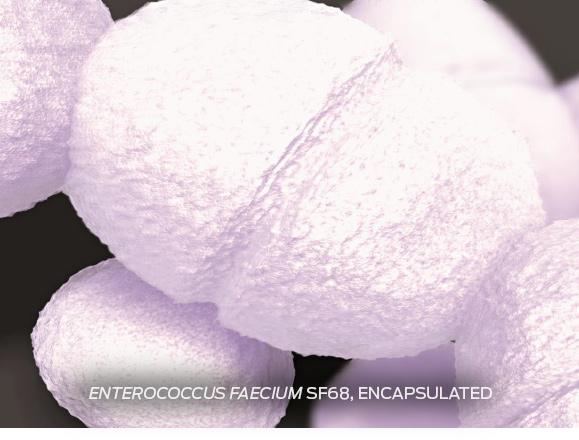
ENTEROCOCCUS FAECIUM SF68

The gut is home to hundreds of different species of bacteria and other microorganisms such as protozoa, viruses and fungi.
Many of these are beneficial, but some are potentially pathogenic. Collectively, these are known as the microbiota. The number of microorganisms living in the gut is in the trillions – there are as many microbial cells in the gut as there are cells in the entire body.1
These resident microorganisms (or commensal bacteria) play roles in energy regulation, mineral absorption, vitamin synthesis, gut barrier function, and the functioning of the immune system. They also provide a barrier against pathogens, and help to nourish the gut.

Probiotics are live microorganisms that can help to maintain the optimal balance of gut bacteria. Maintaining a diverse and balanced population of gut bacteria is essential for good health. An imbalanced microbiota can result in poor fecal quality and impaired immune system function. The composition of the gut microbiota is largely affected by diet, but a variety of factors can alter the balance between beneficial and pathogenic species, and adversely affect pet health.
Probiotics are an example of a nutritional intervention that can help, by a variety of mechanisms to shift the microbiota toward more beneficial bacterial species.2

KOLOSTRUM
Microbiome and health

Microbial colonization of the intestinal tract is first influenced by the maternal microbiome, environment and nutrition. With age, disease, medical treatments and other stressors, the balance of bacteria in the gut can shift toward larger populations of potentially pathogenic bacteria. Nutritional interventions offer an opportunity to normalize this balance.3–5
Characteristics of probiotics
In recent years, probiotics have emerged as a safe and novel way of maintaining a healthy intestinal microbiota and therefore promoting good pet health. The technical definition of probiotics is: ‘live microorganisms that, when administered in adequate amounts, confer a health benefit on the host.’ Some probiotics help strengthen the immune response and others stimulate the production of anti-inflammatory substances. Probiotics are useful in managing diarrhea and other gastrointestinal issues and have shown promise in different areas like dental health. 6
In order to be effective, a probiotic should:
- Remain live and viable until the time of consumption
- Be resistant to digestion by gastric acid or intestinal enzymes
- Reduce or prevent the adherence of pathogenic bacteria in the gut
- Produce products unfavorable to the growth of pathogens
- Promote a normal and balanced microbiome
- Be safe (e.g. not acquire or transmit antibiotic resistance nor produce any harmful metabolites)
- Enhance the overall health of the pet.

The science behind probiotics
The benefits of probiotics depend largely on the number of live bacteria that are able to transiently colonize the gastrointestinal tract. Probiotics do this by the competitive exclusion of pathogens, and this is accomplished in several ways:
- Probiotics compete with pathogens for nutrients as well as for space, as they act as a physical barrier preventing pathogens from attaching to the gut surface
- Some probiotics can secrete antimicrobial substances like bacteriocins and peroxides
- Through the fermentation of prebiotic material, probiotics produce short chain fatty acids (SCFAs) such as butyrate, lactic acid and acetic acid which nourish enterocytes
- These SCFAs also lower the intestinal pH, thereby inhibiting the growth of pathogenic bacteria as, in general, pathogens prefer a more alkaline environment and beneficial bacteria prefer a more acidic pH.
Purina's research


Probiotics are extremely strain-specific, and different strains within the same species can have very different effects. Probiotics are also dose-dependent, therefore clinical research is needed to establish the correct required amount of a particular strain of bacteria.
Dr. Michael Lappin discusses his work with the Enterococcus faecium SF68 probiotic.
SF68 is a strain of Enterococcus faecium, which has been shown to:
- Help maintain a balanced and healthy population of bacteria in the gut
- Promote a strong immune system
- Improve poor fecal quality associated with microbiota imbalance, stress, antibiotic therapy or diet change
- Improve fecal quality and decrease fecal variability in puppies and kittens
- Improve flatulence in dogs.7 –14
Key things to remember
- Probiotics are live bacteria that, when ingested, have a beneficial effect on gut function.
- In order to be effective, the appropriate strain and dosage of probiotic must be carefully selected and tested for safety and stability.
- Probiotics can help maintain the optimal balance between beneficial and potentially pathogenic bacteria in the gut.
- Enterococcus faecium SF68 is a probiotic which has been shown, among other benefits, to help maintain a balanced and healthy population of bacteria in the gut.
Find out more
1. Sender, R., Fuchs, S., & Milo, R. (2016). Revised estimates for the number of human and bacteria cells in the body. PLoS Biology, 14(8):e1002533. doi: 10.1371/journal.pbio.1002533
2. Sanders, M. E. (2008). Probiotics: Definition, sources, selection, and uses. Clinical Infectious Diseases, 46 (Suppl 2), S58–61. doi: 10.1086/52334.
3. Guard, B. C., Mila, H., Steiner, J. M., Mariani, C., Suchodolski, J. S., & Chastant-Maillard, S. (2017). Characterization of the fecal microbiome during neonatal and early pediatric development in puppies. PLoS ONE, 12(4), e0175718. http://doi.org/10.1371/journal.pone.0175718
4. Romano-Keeler, J., & Weitkamp, J. H. (2015). Maternal influences on fetal microbial colonization and immune development. Pediatric Research, 77(1-2), 189–95. doi: 10.1038/pr.2014.163
5. Young, W., Moon, C. D., Thomas, D. G., Cave, N. J., & Bermingham, E. N. (2016). Pre- and post-weaning diet alters the faecal metagenome in the cat with differences vitamin and carbohydrate metabolism gene abundances. Scientific Reports, 6, 34668. http://doi.org/10.1038/srep34668
6. World Health Organization (WHO) & Food and Agriculture Organization of the United States (FAO). (2006). Probiotics in food: Health and nutritional properties and guidelines for evaluation. (ISSN 0254-4725)
7. Benyacoub. J., Czarnecki-Maulden, G. L., Cavadini, C., Sauthier, T., Anderson, R. E., Schiffrin, E. J., & von der Weid, T. (2003). Supplementation of food with Enterococcus faecium (SF68) stimulates immune functions in young dogs. Journal of Nutrition, 133(4), 1158–1162.
8. Bybee, S. N., Scorza, A. V., & Lappin, M. R. (2011). Effect of the probiotic Enterococcus faecium SF68 on presence of diarrhea in cats and dogs housed in an animal shelter. Journal of Veterinary Internal Medicine, 25(4), 856–60. doi: 10.1111/j.1939-1676.2011.0738.x
9. Fenimore, A., Martin, L., & Lappin, M. R. (2017). Evaluation of metronidazole with and without Enterococcus faecium SF68 in shelter dogs with diarrhea. Topics in Companion Animal Medicine, 32(3), 100–103. doi: 10.1053/j.tcam.2017.11.001
10. Lappin, M. R., Veir, J. K., Satyaraj, E., & Czarnecki-Maulden, G. L. (2009). Pilot study to evaluate the effect of oral supplementation of Enterococcus faecium SF68 on cats with latent feline herpesvirus 1. Journal of Feline Medicine and Surgery, 11:650–654.
11. Simpson, K. W., Rishniw, M., Bellosa, M., Liotta, J., Lucio, A., Baumgart, M., & Bowman, D. (2009). Influence of Enterococcus faecium SF68 probiotic on giardiasis in dogs. Journal of Veterinary Internal Medicine, 23(3):476–481. doi: 10.1111/j.1939–1676.2009.0283.x
12. Torres-Henderson, C., Summers, S., Suchodolski, J., & Lappin, M. R. (2017). Effect of Enterococcus faecium strain SF68 on gastrointestinal signs and fecal microbiome in cats administered amoxicillin-clavulanate. Topics in Companion Animal Medicine, 32(3), 104–108. doi: 10.1053/j.tcam.2017.11.002
13. Veir, J. K., Knorr, R., Cavadini, C., Sherrill, S. J., Benyacoub, J., Satyaraj, E., & Lappin, M. R. (2007). Effect of supplementation with Enterococcus faecium (SF68) on immune functions in cats. Veterinary Therapeutics, 8(4), 229–238.
14. Waldron, M., Kerr, W., Czarnecki-Maulden, G. L., & Davis, J. (2012). Supplementation with Enterococcus faecium SF68 Reduces Flatulence in Dogs. Presented at the International Scientific Congress of the European Society of Veterinary and Comparative Nutrition, Bydgoszcz, Poland